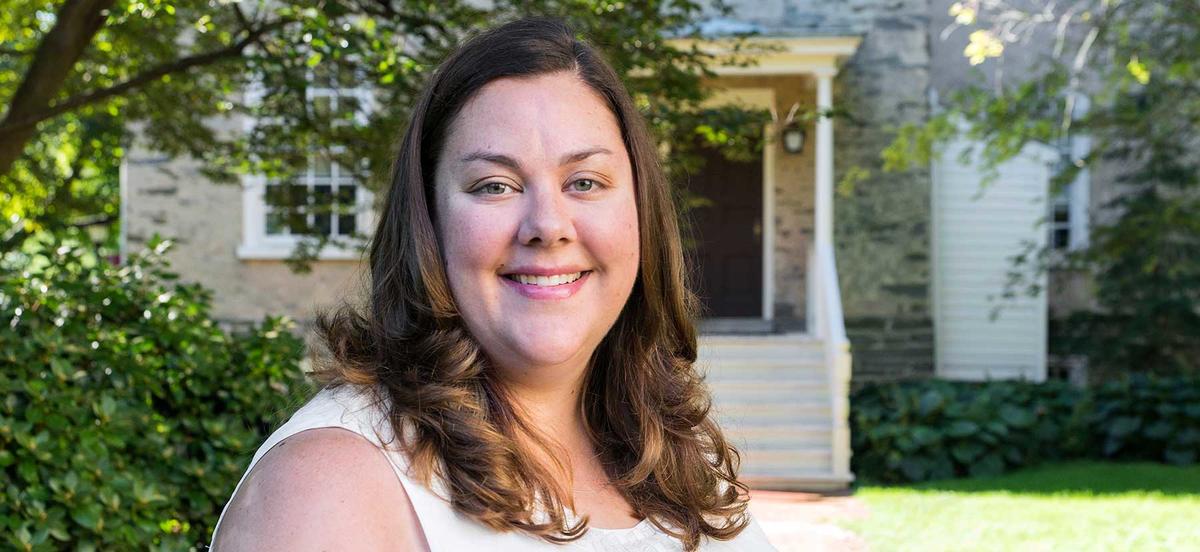Kristen Whalen Awarded NSF Grant

Assistant Professor of Biology Kristen Whalen has been awarded a $374,267 grant from the National Science Foundation. Photo by Patrick Montero.
Details
The assistant professor of biology will lead a team of interdisciplinary scientists to develop new methods to track and translate complex chemical signals exchanged between phytoplankton and bacteria that are fundamental to ocean ecosystems.
Phytoplankton are crucial to the ecosystem of the ocean. They are the base of the food chain, drive the transport of nutrients across the sea, and provide nearly half of the world’s oxygen via photosynthesis. When they die, half of their carbon is consumed by bacteria, and those bacteria provide phytoplankton, during their life, with essential micronutrients and vitamins. This symbiotic relationship is the basis for new research by Assistant Professor of Biology Kristen Whalen that will now be supported by a new $374,267 grant from the National Science Foundation (NSF).
“A newly emerging picture suggests that marine bacteria are not passive in their interactions with their phytoplankton hosts, rather bacteria can take the driver’s seat and impact phytoplankton hosts at many scales,” said Whalen. “This project will develop new methodologies in fluorescent biosensors to quantify the production of bacterial chemical signals at the cellular level in co-cultures of bacteria with their phytoplankton hosts and will help us tease apart the factors that contribute to this symbiosis between partners.”
Understanding how these bacterial signals impact phytoplankton at the cellular level and how these interactions translate to ecosystem-level consequences necessitates cross-disciplinary collaboration. To accomplish this goal, this grant brings together four scientists with expertise across metabolomics, proteomics, physiology, virology, and chemical ecology. Along with Whalen, they include Elizabeth Harvey at the University of New Hampshire, Julia Kubanek at Georgia Institute of Technology, and Brook Nunn at the University of Washington.
“This grant is exciting for me because it allows me to collaborate with three talented female scientists that continue to inspire me to develop new tools to explore the chemical language of marine ecosystems,” said Whalen. “One of the Co-PIs on the grant runs a very productive analytical chemistry lab at Georgia Institute of Technology. Twenty-two years ago she was my undergraduate research mentor in the same lab where she was a postdoc, and instilled in me the excitement of research at the intersection of biology and chemistry. She led the project that resulted in my first co-authored scientific publication as an undergraduate. This grant represents the culmination of 22 years of sustained mentorship, and we have come full circle and I am now in the leadership role.”
Another important part of this research project is that it was designed to mentor underrepresented or underresourced postdoctoral and undergraduate trainees. Four postdoctoral investigators from each collaborating institution will participate in course-based undergraduate research experiences in the Haverford Department of Biology along with Haverford faculty to build supportive scholar-teacher mentoring networks with students and provide training in equitable and inclusive course design. This will be aided by student consultants in the Bi-Co Students as Learners and Teachers Program, an innovative partnership between students and faculty to help the faculty members rethink their courses and pedagogical approaches.
“I anticipate the postdoctoral investigators funded on this grant will bring new expertise and intellectual contributions to this grant, but will also leave a lasting impact on the lives of Haverford undergraduates they mentor along the way,” said Whalen.
Inclusivity in science is as important to Whalen as the science itself. Embedding students as collaborators, so they learn and practice the latest techniques and methodologies while advancing new discoveries is a cornerstone of the Whalen Lab. And with this new grant not only will her team try to explain how chemistry drives symbiosis in the ocean, but they will be working to help mentor and support the next generation of scientific educators.
“I am a firm believer that science is a team sport,” said Whalen, “and I am grateful to have a wonderful group of collaborators that are equally as thrilled about pursuing new discoveries as I am.”



